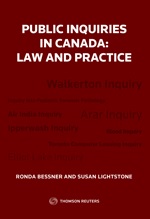
Public Inquiries in Canada
|
Book $198.00 RRP |
Date: 11/10/2017 Code: 9780779880720 Carswell, Canada |
 Public Inquiries in Canada
Price: $198.00
|
Browse:
Available Formats
| Format | Title | Date | Code | Price | |
|---|---|---|---|---|---|
| Book | Public Inquiries in Canada | 11/10/2017 | 9780779880720 | $198.00 |
Add to cart
 Public Inquiries in Canada
Price: $198.00
|
Description
Public inquiries have significantly shaped public policy in Canada. In recent years, we have had inquiries into the safety of drinking water, the use of tasers by police, breast cancer screening, the pediatric forensic pathology system, public contracts in the construction industry, and wrongful convictions. Inquiries continue to proliferate – take a look at the media in Canada in any given week and you’ll find calls for the creation of public inquiries, discussions of the efficacy of ongoing inquiries, and comments about the recommendations from inquiries recently concluded.
Public Inquiries in Canada: A Guide to Law and Practice gives the “full picture” of the workings of an inquiry. Not only does it provide a comprehensive legal overview of an inquiry, it also offers practical guidance through each of the steps in the inquiry process. Through the voices and perspectives of those involved in every aspect of public inquiries, this book serves as a catalogue of the “best practices” in the conduct of a public inquiry, regardless of the mandate or terms of reference of the inquiry. The book is national in scope and the authors have included information that will be useful in all aspects of the inquiry process, and at all levels: federal, provincial/territorial and municipal. Among the many contributors and interviewees in the book, you’ll hear from:
- Commissioners
- Commission counsel
- Investigators
- Journalists
- Counsellors
- Witnesses
In addition to personal and accessible voices, this publication also provides examples of the templates, documents and legislation that can be relied upon by those involved.
Public Inquiries in Canada: A Guide to Law and Practice is organized in chronological fashion, from the calling of an inquiry by a government, to the submission of the commissioner’s report, and to the aftermath. By providing guidance, suggestions and reflections, the authors have assembled a thorough review of the elements of an inquiry and the various roles of those involved. Legal rights and duties are discussed, and relevant cases and statutes are included and analyzed. With practical checklists and precedents, legal analysis and first-hand descriptions from all sides of an inquiry, the book can be used as a legal text, a guidebook, a reference text, or all three.
The book will prove useful to all those involved in a public inquiry. This includes those appointed commissioners of an inquiry (including judges), commission counsel and other members of the commission team such as policy analysts, investigators, document reviewers, media spokespersons, and staff persons working on inquiries; lawyers representing parties; and non-lawyers such as witnesses (including expert witnesses), counselors, journalists, members of the public – and others included in the inquiry process.
Ronda Bessner has had extensive experience with public inquiries, having been the senior legal analyst at five inquiries including the Walkerton Inquiry (contamination of drinking water), the Ipperwash Inquiry (the death of Dudley George in a land claim protest), and the Royal Commission on the Blood System in Canada (tainted blood). In addition, in 2016, Ronda co-designed and co-facilitated two roundtables for federal Cabinet Ministers on the proposed public inquiry into Missing and Murdered Indigenous Women and Girls.
During her career, Ronda has taught at a number of Canadian law schools in the areas of Evidence, Public Inquiries, Criminal Law and Youth Justice. She has also presented and published on the legal aspects of a number of topics including child abuse, HIV/AIDS, novel scientific evidence, and state intervention in pregnancy.
Ronda is Past President of the Women’s Law Association of Ontario and she co-founded the first Canadian Chapter of the Harvard Law School Women’s Alliance. Ronda is also an adjudicator on the Consent and Capacity Board. She was appointed as a lawyer member in 2014.
In 2016, Ronda was awarded the Law Society of Upper Canada Medal for outstanding service to the legal profession.
Susan Lightstone works in three capacities – as an educator, lawyer and writer/editor. She practised banking and corporate law at the Bank of Canada. She served as the education director at the National Judicial Institute, the educational organization which serves the Canadian judiciary. In 2011, Susan began working with the Ontario Court of Justice in Toronto, advising the Court on the design, development and delivery of their educational programming for justices of the peace and judges. Currently, she serves as Counsel in the Office of the Chief Justice, Ontario Court of Justice.
Susan worked as a part-time professor at the Faculty of Law, University of Ottawa, where she taught persuasive writing. Her work has included co-authoring several books and has appeared in an array of publications, including the Canadian Bar Association’s National, the Canadian Medical Association Journal, The Globe and Mail, and the Ottawa Citizen.
For 15 years, she was a lawyer member of Ontario’s Consent and Capacity Board.
 Administrative Law
Administrative Law